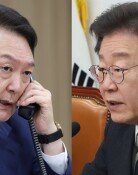Facts and myths about Presidents Office
Facts and myths about Presidents Office
Posted March. 21, 2014 02:52,
Secretaries have no mouth.
All chief presidential secretaries in Korea including the incumbent Chief of Staff Kim Ki-choon have stuck to this rule. Nevertheless, peoples attention to the Presidents Office, the center of Koreas executive power, has never withered generating various rumors because it is where people closest to the president work. Passing the first anniversary of its inauguration, the Park Geun-hye administration is also dealing with various rumors.
The president has two Jindo dogs, a breed of hunting dog native to Korea, in the presidential residence. It is jokingly said in the political circle that those whom these dogs do not bark at but wag tails to are big shots of the time. This rumor is probably based on the belief that the dogs are more familiar with the people who visit the presidential residence more often. Chief of Staff Kim Ki-choon, Chief of the Office of National Security Kim Jang-soo and Senior Presidential Secretary for Public Relations Lee Jung-hyun are among those considered influential based on this belief.
However, the truth is that the dogs hardly bark even at strangers. In particular, Himang, the male dog, barks along a few times only as Saerom, the female dong, barks first. People say he barks louder not when he saw a stranger but when he is in good condition. Besides, it is very rare any of the chiefs or senior secretaries meets with the president in her residence.
Another rumor is that many senior secretaries do not even get a chance to talk to the president face-to-face because those close to the president prevent them from meeting the president.
One aide said, People usually expect that Lee Jung-hyun (Senior Presidential Secretary for Public Affairs) meet the president the most, but it is not true. When the three-year plan for economic innovation was a priority, (the president) met Senior Presidential Secretary for Economic Affairs Cho dong-won and Senior Presidential Secretary for Foreign Affairs Ju Chul-ki almost every day. Before announcing major policies, she consults with senior secretaries for relevant polices. Therefore, secretaries for policy-related areas meet the president more often than secretaries for political affairs-related areas. But this does not necessarily mean that Lee is not one of the most influential. He certainly gets frequent phone calls from the president.
There is also a rumor that the aides hardly manage to speak to the president and just receive her directions. This was partly true at the beginning of the administration because public officials who have not worked with the president were mostly appointed as senior secretaries.
One presidential aide commented, The atmosphere of senior secretaries meetings has been changing. During the initial period of the administration, the meeting was conducted in a way that each secretary reported to the president and the president made her comments on it. But these days, secretaries often have discussions in the meeting, so the meeting, which used to end around 11:30 a.m., is sometimes over after 12:00 p.m. It is said that the president complains the meeting extends beyond lunchtime, but that she actually seems to enjoy such an atmosphere.
The presidential aides now have better understanding about the presidents philosophy for governmental management. Senior Presidential Secretary for State Planning Yoo Min-bong puts more emphasis on completing tasks in progress than on creating new tasks. Senior Presidential Secretary for Education and Culture Mo Cheol-min takes care of current issues of his area firsthand.
Rumors surrounding the Presidents Office, including the recent one that Chief of Staff Kim might resign soon, will never stop being generated. People directly affected by such rumors may feel frustrated, but rumors reflect the hearts and minds of people to some extent. It would be worthwhile that the presidential aides reflect on the results of the Dong-A Ilbos survey on the chiefs and senior secretaries of the Presidents Office. Courage to frankly speak to the president has been selected as what the aides need the most.







